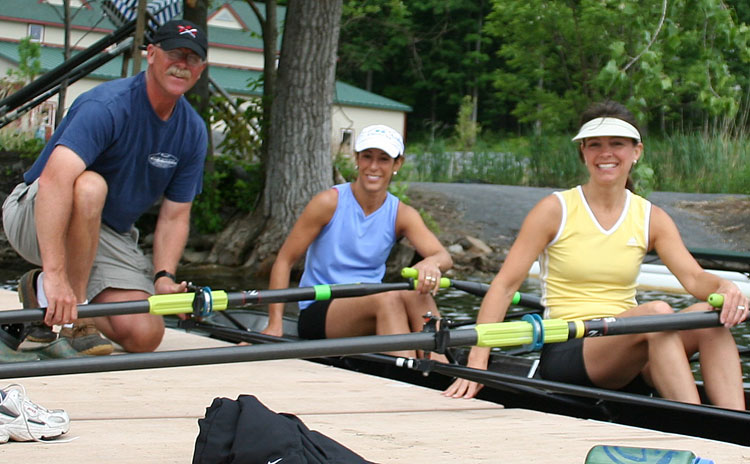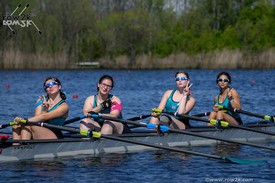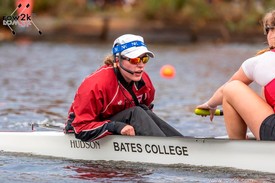row2k Features
Rowing Families
Megaphone, Unisuit, Tailgate… Ready for Anything

Megaphone, Unisuit, Tailgate… Ready for Anything

Bob Tarrant and charges
"I am just waiting for the coffee barge to come by," quips Joan Lentini, as she stands on a pontoon boat at the start of a race in upstate New York in the early spring. It is raining full-tilt and a good bit of wind is blowing every bow to port. A USRA official, she waits patiently while the novice coxswains make a go at this pointing business.
"We are going to a countdown start," she finally announces.
The coffee barge never shows.
This is Lentini's spring. Although she tries to be assigned races where her daughter Lindsay lines up, traveling isn't always an option with her 'day job.' So she checks out Syracuse's results online after a day of the cold rain soaking through her navy blue blazer and khakis.
"I just love it when I can just be a crew parent," but, she really can't remember the last time she was hanging out on the shore with binoculars and pasta salad. In the fall head races, Lentini is in the engine room of boats for Skidmore Community Rowing. She has in the past waved to son A.J., who rowed briefly at Rochester Institute of Technology, and Lindsay, as varsity rower at Syracuse, while she warmed up on the water with her own slightly older crew.
Masters rowers tend to be more than just athletes. They don't squeeze into a uni, hop in a boat, pull hard then pack it up and head home. Chances are the person that lines up at a Masters regatta is a crew parent, volunteer coordinator, coach, referee, or general regatta or boathouse helper. They are picking up empty water bottles at racing venues at dusk, and going out for a training row the next dawn. Master rowers have found time to be athletes in a time-consuming sport while concurrently focusing on careers and often, parenting. They are committed. They wake up way earlier than the rest of the world.
Covering all the bases
The Tarrant family is propelled by a giant oar, or maybe a 20 HP Mercury outboard, depending on the day. Bob Tarrant is a coach for Emma Willard School in Albany, New York, a masters' coach at Saratoga Rowing Association, and a youth coach at the family-owned Saratoga Rowing Center. He also rows (when he gets a chance), aligns races, drives launches for officials at regattas, and maintains the fleet of sculling shells his center uses for individual coaching. His wife Jean, or Bean as she is known, is the sculling coach for Saratoga Rowing Association, owns a small rowing apparel line (Green Bean Design-catch the Bean?), and is mom to three rowers, one of which is heading to Radcliffe to be in the lightweight program next fall.
They are the quintessential rowing family. "I don't get stale or bored. I coach anyone from eight to seventy-eight, I like the variety," says Bob. "The most satisfying part is watching a rower of any age go from not knowing which end of the boat is which to rowing technically well and enjoying it... no matter how fast."
In a sense, they have sacrificed their own rowing experience for the benefit of others on the local waters. While Bob jumped in a boat at the Masters Nationals in 2005, he finds that he practically needs to make an appointment with himself to get on the water these days.
The hook
"They see their children row, and they are curious…the first good catch, first smooth drive, and they are hooked," says Tarrant of many of his master's rowers.
Many of these crew parents see the quality of kids their own children are spending time with, and find it is something about the sport. It develops a unique character, a goodness and honesty bred from 2k erg pieces and seat racing, a camaraderie that emerges when you get spiritual at the sprint, a humanity of the boathouse ("I'll carry your oars in!"), and it is plain infectious.
Parents, in true toddler form, say, "I want that too!"
Boathouse culture
When it gets right down to it, the extension of family may be the greatest value of any community group. The necessity of rowers to 'swing' and 'catch' together fortifies that family-like bond. The nature of the sport is unity, and it carries on to the social groups that emerge from the boathouse.
For rowers that have re-entered the sport after the children are in school, or are new to the sport when they see it on the Olympic coverage, the sport is about athleticism and gossip combined. It is like going out for a run with your book club. Or taking a spin on a bike with fraternity friends-a happy blend of burn, brains and buddies. It runs so deep that many masters find themselves immersed in the sport, girding up the infrastructure.
"We are going to a countdown start," she finally announces.
The coffee barge never shows.
This is Lentini's spring. Although she tries to be assigned races where her daughter Lindsay lines up, traveling isn't always an option with her 'day job.' So she checks out Syracuse's results online after a day of the cold rain soaking through her navy blue blazer and khakis.
"I just love it when I can just be a crew parent," but, she really can't remember the last time she was hanging out on the shore with binoculars and pasta salad. In the fall head races, Lentini is in the engine room of boats for Skidmore Community Rowing. She has in the past waved to son A.J., who rowed briefly at Rochester Institute of Technology, and Lindsay, as varsity rower at Syracuse, while she warmed up on the water with her own slightly older crew.
Masters rowers tend to be more than just athletes. They don't squeeze into a uni, hop in a boat, pull hard then pack it up and head home. Chances are the person that lines up at a Masters regatta is a crew parent, volunteer coordinator, coach, referee, or general regatta or boathouse helper. They are picking up empty water bottles at racing venues at dusk, and going out for a training row the next dawn. Master rowers have found time to be athletes in a time-consuming sport while concurrently focusing on careers and often, parenting. They are committed. They wake up way earlier than the rest of the world.
Covering all the bases
The Tarrant family is propelled by a giant oar, or maybe a 20 HP Mercury outboard, depending on the day. Bob Tarrant is a coach for Emma Willard School in Albany, New York, a masters' coach at Saratoga Rowing Association, and a youth coach at the family-owned Saratoga Rowing Center. He also rows (when he gets a chance), aligns races, drives launches for officials at regattas, and maintains the fleet of sculling shells his center uses for individual coaching. His wife Jean, or Bean as she is known, is the sculling coach for Saratoga Rowing Association, owns a small rowing apparel line (Green Bean Design-catch the Bean?), and is mom to three rowers, one of which is heading to Radcliffe to be in the lightweight program next fall.
They are the quintessential rowing family. "I don't get stale or bored. I coach anyone from eight to seventy-eight, I like the variety," says Bob. "The most satisfying part is watching a rower of any age go from not knowing which end of the boat is which to rowing technically well and enjoying it... no matter how fast."
In a sense, they have sacrificed their own rowing experience for the benefit of others on the local waters. While Bob jumped in a boat at the Masters Nationals in 2005, he finds that he practically needs to make an appointment with himself to get on the water these days.
The hook
"They see their children row, and they are curious…the first good catch, first smooth drive, and they are hooked," says Tarrant of many of his master's rowers.
Many of these crew parents see the quality of kids their own children are spending time with, and find it is something about the sport. It develops a unique character, a goodness and honesty bred from 2k erg pieces and seat racing, a camaraderie that emerges when you get spiritual at the sprint, a humanity of the boathouse ("I'll carry your oars in!"), and it is plain infectious.
Parents, in true toddler form, say, "I want that too!"
Boathouse culture
When it gets right down to it, the extension of family may be the greatest value of any community group. The necessity of rowers to 'swing' and 'catch' together fortifies that family-like bond. The nature of the sport is unity, and it carries on to the social groups that emerge from the boathouse.
For rowers that have re-entered the sport after the children are in school, or are new to the sport when they see it on the Olympic coverage, the sport is about athleticism and gossip combined. It is like going out for a run with your book club. Or taking a spin on a bike with fraternity friends-a happy blend of burn, brains and buddies. It runs so deep that many masters find themselves immersed in the sport, girding up the infrastructure.
SUPPORT ROW2K
If you enjoy and rely on row2k, we need your help to be able to keep doing all this. Though row2k sometimes looks like a big, outside-funded operation, it mainly runs on enthusiasm and grit. Help us keep it coming, thank you! Learn more.
If you enjoy and rely on row2k, we need your help to be able to keep doing all this. Though row2k sometimes looks like a big, outside-funded operation, it mainly runs on enthusiasm and grit. Help us keep it coming, thank you! Learn more.
Rowing Features
In the Driver's Seat, with Olivia Seline
April 23, 2024
This Week's Best of Rowing on Instagram 4/20/2024
April 20, 2024
In the Driver's Seat, with Lizzie Johnston
April 16, 2024
This Week's Best of Rowing on Instagram 4/13/2024
April 13, 2024
Rowing Headlines
2024 Inaugural CRCA Athletes to Watch
March 13, 2024
World Rowing suspends Serbian Rowing Federation over financial debts
January 23, 2024
National Rowing Hall of Fame ® Class of 2023 Announced
October 5, 2023
Advertiser Index
- Bont Rowing
- Calm Waters Rowing
- Concept 2
- Craftsbury Sculling
- The Crew Classic
- CrewLAB
- Croker
- Dad Vail Regatta
- Durham Boat Co.
- Empacher
- Faster Masters
- Filippi
- Fluidesign
- h2row.net
- HUDSON
- Live2Row Studios
- Nielsen-Kellerman
- Oak Ridge RA
- Peinert Boat Works
- Pocock Racing Shells
- Race1 USA
- Rockland Rowing Masters Regatta
- RowKraft
- Rubini Jewelers
- Vespoli USA
- WinTech Racing
Get Social with row2k!
Get our Newsletter!
Enter your email address to receive our weekly newsletter.
Support row2k!
Advertiser Index
- Bont Rowing
- Calm Waters Rowing
- Concept 2
- Craftsbury Sculling
- The Crew Classic
- CrewLAB
- Croker
- Dad Vail Regatta
- Durham Boat Co.
- Empacher
- Faster Masters
- Filippi
- Fluidesign
- h2row.net
- HUDSON
- Live2Row Studios
- Nielsen-Kellerman
- Oak Ridge RA
- Peinert Boat Works
- Pocock Racing Shells
- Race1 USA
- Rockland Rowing Masters Regatta
- RowKraft
- Rubini Jewelers
- Vespoli USA
- WinTech Racing

















